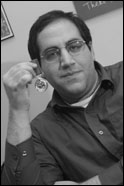Kaleidoscope
Yonatan Petel: Mettle earns medal
 |
|
The notion of bravery is elusive. Yet you'd think Yonatan Petel, recent recipient of the Governor General's Medal of Bravery, would be able to define it.
"If it's something I wouldn't do, it's brave," suggests Petel.
Petel is in his third year of studies at McGill, finishing a major in mathematics and physics and a minor in Jewish studies. His duties as co-president of McGill Hillel, the hub for the Jewish community at McGill, keep him extra-busy.
Like any undergraduate, Petel is unsure of what his future holds for him. Nonetheless, he can feel certain that already his life has served some good. In July 1997, he and his dad, Shaul Petel, saved a girl from drowning during a camping trip at Myrtle Beach in South Carolina.
After checking out on the last day of that trip, the Petels hung out on the beach before starting the journey back home. Yonatan heard kids shouting, "Someone's drowning," so he got his dad and ran to the water's edge. Far off, a girl was struggling in the water, a man was closer to shore. The lifeguards were off duty.
Petel didn't even think. "You hear somebody's drowning, you try to help them. What's disturbing is that there weren't others helping."
He swam to the panicky girl and had her hang onto his shoulders while he swam back. Her hands kept slipping around his neck, nearly choking him, but he swam to his father, now in the water, and handed her to him.
She was screaming, "My Daddy, my Daddy," then Yonatan swam out to the man who was already unconscious and bobbing vertically in the waves. He tried to pull him in, and Shaul went over to help. By this time, a crowd had gathered on the beach, and someone threw a lifejacket out towards them, which Yonatan retrieved and brought to Shaul. Exhausted, they returned to shore and the girl and her father were taken to the hospital. The girl's cousin was also missing, so a human chain was formed to search for him, with no luck.
The Petels drove home. To top off their memorable day, their car broke down in New Jersey. The only person to aid these Good Samaritans was a cop.
Later, through hearsay, the Petels pieced together the story at the beach. The family was from Kentucky, on their first day at the ocean. The girl began to flounder, her father and cousin tried to help. The girl's father died in the hospital. Her cousin's body washed up on shore a couple of weeks later.
Not all rescues have a happy ending. "The girl had no injuries, physically, but you'd have a lot of guilt if your dad and cousin died trying to help you," Petel surmises. "We hope the girl has moved on."
A year later, the Carnegie Hero Fund Commission contacted the Petels to ask about their version of events as witnesses, not rescuers. There had been a mix-up, with others getting credit for the rescue, perhaps because of the wonky editing of a local news report from that night.
The Governor General's office got wind of Petel's deed, and in a formal ceremony, he and Shaul were awarded with Medals of Bravery, along with 30 others. Petel was impressed by Rideau Hall -- "You see where the tax money goes" -- and enjoyed hearing the other heroes' tales. "It was a privilege to be among these people."
He's still uncomfortable about being labelled a hero himself. "It's a surreal experience to have people come up to you and say 'I couldn't do what you did' and call you 'heroic.'" To Petel, a hero is the Star of Courage recipient who rescued a six-year-old girl from a burning building, despite his hair catching on fire (he left, put out the flames on his head, then went back in). But that hero, too, is just "an ordinary guy.
"It restores your faith in humanity," he says, of the Medal of Bravery winners. Especially in light of September 11. "There are people who will give their life to kill people they don't know, and there are people who will give their life to save people they don't know.
"The ceremony is nice, the medal is nice, but the real reward is knowing we saved somebody," Petel says. "Somewhere out there is a 17-year-old who wouldn't be out there if weren't for us."
Cows on Ice
 ILLUSTRATION: Tzigane
ILLUSTRATION: Tzigane |
|
The Dairy Farmers of Canada recently held a casting call that played out as a cattle call.
The organization was preparing for a TV commercial that would be aired during the Salt Lake City Olympics, touting the benefits of milk. The commercial called for 12 cows to portray ice skating judges watching Olympic skaters at work. The organization visited several farms, including the one at Mac-donald Campus.
"They fell in love with our cows," says agricultural and biosystems engineering professor Suzelle Barrington, the director of the farm's dairy unit.
"They needed cows that were clean, good looking and fully relaxed. They didn't want cows that would be running all over the place during shooting. Our cows were quiet and well-behaved when they came to visit."
Barrington says the cows are content with good reason. "They're extremely well looked after here. They're happy and it shows."
So 12 dry cows -- cattle that aren't being milked -- piled into two big trailors one early December morning and headed to the big city in search of fame. The commercial was filmed at Université de Montréal's skating rink.
Macdonald Campus netted $1,000 from the deal in addition to having all the cows' commercial-related expenses paid. The commercial will begin being shown about two weeks before the Olympics start in February.
This won't be the cows' first brush with fame -- they've also appeared on an episode of Popular Mechanics for Kids.
Barrington says her charges haven't gone Hollywood on her yet. "But they are asking for a TV now."
 |
||||
|
If Canadian society is in every serious and discernible aspect to be the same as the U.S., the reason for having a Canada disappears. What I see now is such a subservience to the simple cash incentive. We're forgetting why we might be Canadians. |
||||
Where Leonard was little
 |
|
We've all had brushes with him. Leonard Cohen, man of the Main, thoughtful Lothario turned Mount Baldy monk. It's hard to live in Montreal and not know someone who met someone who...
Well, imagine living in his boyhood home, where a sweaty-palmed young Len dreamt of girls and, maybe, fame.
Registrar Robin Geller and her husband bought that very house in 1996 and moved in the next spring. They had been looking for property in the Westmount area for some time, and were delighted when, Geller says, "an acquaintance said he knew of a house that would be up for sale privately." And, oh, by the way, Leonard Cohen owns it.
Cohen co-owned the house with his sister. "Neither had lived in it full-time, for some time." The home was sold with about two-thirds of its contents.
Not only did Geller gain a new dining room set but also the family's bedroom furniture. "My oldest son is sleeping in Leonard Cohen's bed."
Do Cohenheads show up at her door, asking to be in Lenny's room of teenage angst? Do swooning women peer in her windows, hoping to glimpse the table at which their god munched bagels?
"Not a ton, for which we have been grateful," Geller says. But there were a few eager groups in 2000 when McGill hosted a conference on Cohen. People lurked on their front lawn, and Geller's husband invited them in. "They came in and walked around and were very very happy."
The Cohens also left behind memorabilia. Tennis racquet, baseball glove, a guitar, even a platinum album.
"The guitar's pretty cool, I have to say." Geller thinks this was his first. She also likes the sporting stuff. "It's fun to think he was once a kid living in that house, doing kid-like things."
 |
||||
|
We shouldn't imagine that we can turn things around 180 degrees all at once. Change is a process. It takes a lot of trying and a lot of nudging. |
||||

